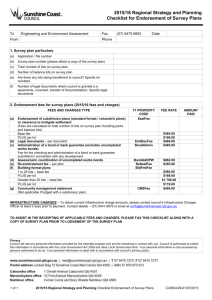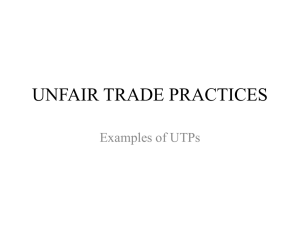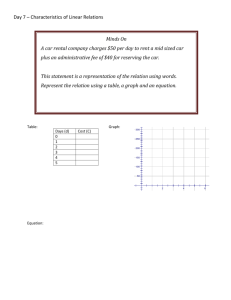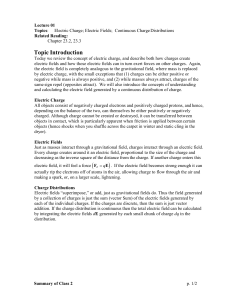- DakshaLegal
advertisement
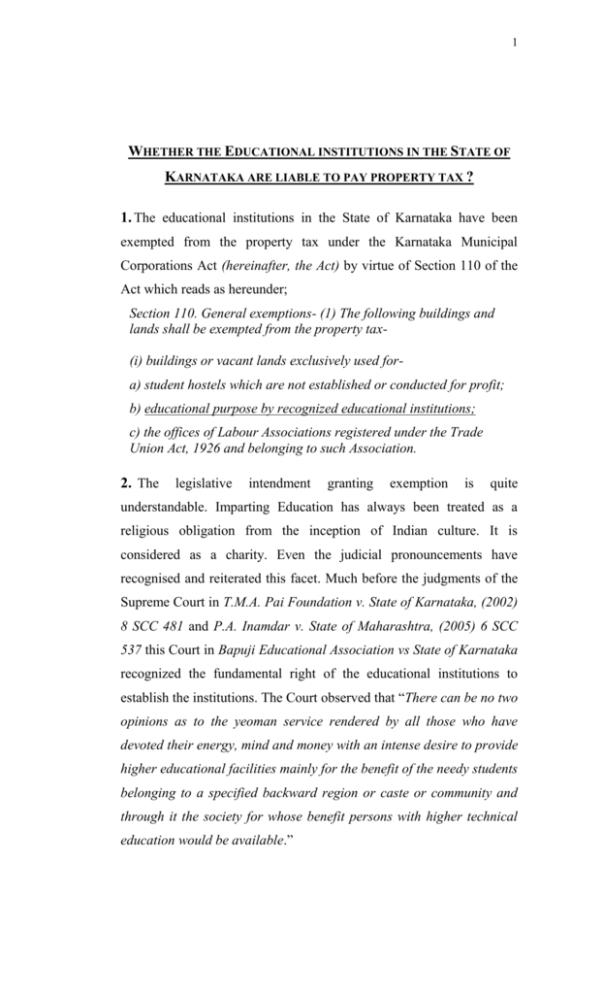
1 WHETHER THE EDUCATIONAL INSTITUTIONS IN THE STATE OF KARNATAKA ARE LIABLE TO PAY PROPERTY TAX ? 1. The educational institutions in the State of Karnataka have been exempted from the property tax under the Karnataka Municipal Corporations Act (hereinafter, the Act) by virtue of Section 110 of the Act which reads as hereunder; Section 110. General exemptions- (1) The following buildings and lands shall be exempted from the property tax(i) buildings or vacant lands exclusively used fora) student hostels which are not established or conducted for profit; b) educational purpose by recognized educational institutions; c) the offices of Labour Associations registered under the Trade Union Act, 1926 and belonging to such Association. 2. The legislative intendment granting exemption is quite understandable. Imparting Education has always been treated as a religious obligation from the inception of Indian culture. It is considered as a charity. Even the judicial pronouncements have recognised and reiterated this facet. Much before the judgments of the Supreme Court in T.M.A. Pai Foundation v. State of Karnataka, (2002) 8 SCC 481 and P.A. Inamdar v. State of Maharashtra, (2005) 6 SCC 537 this Court in Bapuji Educational Association vs State of Karnataka recognized the fundamental right of the educational institutions to establish the institutions. The Court observed that “There can be no two opinions as to the yeoman service rendered by all those who have devoted their energy, mind and money with an intense desire to provide higher educational facilities mainly for the benefit of the needy students belonging to a specified backward region or caste or community and through it the society for whose benefit persons with higher technical education would be available.” 2 3. The Karnataka High Court in The Town Municipal Council, Mulki vs Vijay College, Mulki = Writ Petition 5381/1979 decided on 13:12:1985 considered the question as to whether the buildings which are exclusively used for education could be subjected to building tax under Section 94 of the Town Municipality Act. Answering the question in the negative, this Court held that levy of property tax by the Town Municipal Council on the buildings belonging to the education institution should be struck down and ordered accordingly. 4. The Constitution bench of the Supreme Court in T.M.A. Pai Foundation v. State of Karnataka, (2002) 8 SCC 481, recognized the right to establish & run the educational institutions as a fundamental right under the Constitution of India. The Supreme Court held that the establishment and running of an educational institution where a large number of persons are employed as teachers or administrative staff, and an activity is carried on that results in the imparting of knowledge to the students, must necessarily be regarded as an occupation. Education, per se, fall under Article 19(1)(g) "Occupation". Occupation is an activity of a person undertaken as a means of livelihood or a mission in life. The right to establish and maintain educational institutions is also sourced to Article 26(a), which grants, in positive terms, the right to every religious denomination or any section thereof to establish and maintain institutions for religious and charitable purposes. Education is a recognized head of charity. 5. Therefore, religious denominations or sections thereof, which do not fall within the special categories carved out in Article 29(1) and 30(1), have the right to establish and maintain religious and educational institutions. This would allow members belonging to any religious 3 denomination, including the majority religious community, to set up an educational institution. Given this, the phrase "private educational institution" would include not only those educational institutions set up by the secular persons or bodies, but also educational institutions set up by religious denominations. Education used to be charity or philanthropy in good old times and the tradition continues. Even now, imparting education has come to be a mission in life for some altruists. This core declaration is followed by the Supreme Court in P.A. Inamdar v. State of Maharashtra, (2005) 6 SCC 537. 6. However, Section 110(2) provides for imposition of “Service Charges” by the BBMP on the educational institutions. This sub- section says that nnotwithstanding the exemptions granted under this section it shall be open to the corporation to collect service charges for providing civic amenities and for general or special services rendered at such rates as may be prescribed. The Government has framed the Rules namely the Bruhat Bangalore Mahanagara Palike Property Tax Rules, 2009 (hereinafter called the Rules). These are published by way of Notification No. UDD 220 MNU 2006(P), Bangalore, dated 13th January, 2009. Rule 10 of the Rules read as follows: 10. Levy of service charges for the buildings exempted from property tax. Service charges for providing civic amenities in respect of buildings exempted from property tax under section 110 excluding places of worship shall be charged at the rate of 25 percent of the property tax exempted plus cess as applicable to such land or building or both; Provided that subject to clause (b) of sub-section (1) of section 110, such exempted properties that are let out for commercial purpose shall be charged at regular rates of property tax applicable for that zone and category. 4 7. Subsequently, BBMP issued a Notification - I bearing No. COMMR/ BBMP-DC (RES)/ 321-A/08-09, Bangalore, dated 31:1:2009. Under this Notification at Category XVI, the Service Charges to be paid in respect of the buildings exempted from property tax under Section 110 of the Act is fixed at 25% of the property tax. 8. However, a question may arise whether the imposition is valid without quid-pro-quo. The legal position as declared by the Supreme Court in Municipal Corpn., Amritsar v. Senior Supdt. of Post Offices, (2004) 3 SCC 92, is that the declared the law in this regard as follows; 8. The question, whether the demand so made was by way of “service charge” or “tax”, need not detain us any longer. The demand so made was with regard to the services rendered to the respondents' Department, like water supply, street-lighting, drainage and approach roads to the land and buildings. In the counter, the respondents averred that they are paying for the services rendered by the appellant Corporation by way of water and sewerage charges and power charges separately. It is also categorically averred that no other specific services are being provided to the respondents for which the tax in the shape of service charges can be levied and realized from the respondents. There is no provision in the Municipal Corporation Act for levying service charges. The only provision is by way of tax. Undisputedly, the appellant Corporation is collecting the tax from general public for water supply, street-lighting and approach roads etc. Thus, the “tax” was sought to be imposed in the garb of “service charges”. The interplay of the constitutional and legal provisions being well cut and well defined, it was clearly not within the competence of the Corporation to impose tax on the property of the Union of India, the same being violative of Article 285(1) of the Constitution.” 5 9. Again in a recent decision, the Supreme Court in Dewan Chand Builders & Contractors v. Union of India,(2012) 1 SCC 101 declared as hereunder; “9. … The neat and terse definition of ‘tax’ which has been given by Latham, C.J., in Matthews v. Chicory Mktg. Board is often cited as a classic on this subject. ‘A tax’, said Latham, C.J., ‘is a compulsory exaction of money by public authority for public purposes enforceable by law, and is not payment for services rendered’. In bringing out the essential features of a tax this definition also assists in distinguishing a tax from a fee. It is true that between a tax and a fee there is no generic difference. Both are compulsory exactions of money by public authorities; but whereas a tax is imposed for public purposes and is not, and need not, be supported by any consideration of service rendered in return, a fee is levied essentially for services rendered and as such there is an element of quid pro quo between the person who pays the fee and the public authority which imposes it. If specific services are rendered to a specific area or to a specific class of persons or trade or business in any local area, and as a condition precedent for the said services or in return for them cess is levied against the said area or the said class of persons or trade or business the cess is distinguishable from a tax and is described as a fee. Tax recovered by public authority invariably goes into the consolidated fund which ultimately is utilised for all public purposes, whereas a cess levied by way of fee is not intended to be, and does not become, a part of the consolidated fund. It is earmarked and set apart for the purpose of services for which it is levied.” 10. A fee is levied essentially for services rendered and as such there is an element of quid pro quo between the person who pays the fee and the public authority which imposes it. If specific services are rendered to a specific area or to a specific class of persons or trade or business in any local area, and as a condition precedent for the said services or in return for them cess is levied against the said area or the said class of persons or trade or business the cess is distinguishable from a tax and is described as a fee. A fee is earmarked and set apart for the purpose of services for which it is levied. In the instant case, the 6 contribution of BBMP towards the educational institutions like the petitioners is completely nil given the fact that the petitioners have been paying the required charges to various Government department concerned. When there is absolutely no quid pro quo for the service charges sought to be levied, the BBMP may not justify imposition of service charges. 11. Fee is a sum of money taken in respect of a benefit arising out of the temporary use of land. It implies some consideration moving to the public either in the form of a liberty, privilege or service. In other words, for the valid imposition of a fee, there must be a corresponding benefit. Having regard to the compensatory nature of the levy, the fee must bear a reasonable relationship to the providing of benefit. 12. Though the terminology used in the impugned Rules is ‘service charge’, in effect the Rules propose to impose service tax. The nature of the impugned imposition is tax. As held by the Supreme Court in Bharat Sanchar Nigam Ltd. v. Union of India, (2006) 3 SCC 1, if it is a service then the Central Government alone can levy service tax under Entry 92-C of List I of Schedule 7 to the Constitution of India. The State Legislature has no competence to impose the service tax in the guise of service charges. Though the charges levied are termed as service charges but in effect the same is in the nature of imposing tax. Since the same is imposed without any authority of law, it is opposed to Article 265 of the Constitution of India which specifically says that no tax shall be levied or collected except by authority of law. 13. Constitutional validity of Rule 10 of the Bruhat Bangalore Mahanagara Palike Property Tax Rules, 2009 was challenged before the High Court of Karnataka in several writ petitions. 7 14. The High Court felt that the question of imposing Service Charge arises only if the buildings of the educational institutions are exempted from property tax under Section 110(2). Hence the writ petitions are disposed permitting the educational institutions to apply to BBMP seeking exemption. If the exemption is granted, the educational institutions can still challenge imposition of Service Charges. 15. The BBMP notification mandates that every application for exemption shall be accompanied by 25% of the property tax amount. This appears to be one-time payment. On getting the exemption, the buildings of the educational institutions fall outside the purview of property tax. However they are liable to pay service charges. On the grounds above stated, even the imposition of service charge can be challenged before the High Court. S. BASAVARAJ, Daksha Legal Advocates Unit No.1, 2nd floor, No.11, Jeevan Buildings (new block) Kumara Park East, Bangalore 560001 Ph: +91 080 41138502 Cel: 9845065416 email: raj@dakshalegal.com

